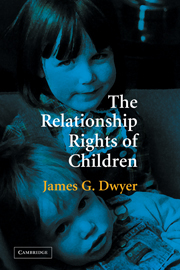Book contents
- Frontmatter
- Contents
- Acknowledgments
- THE RELATIONSHIP RIGHTS OF CHILDREN
- Introduction
- 1 Why Rights for Children?
- 2 The Existing Relationship Rights of Children
- 3 Paradigmatic Relationship Rights
- 4 Why Adults Have the Relationship Rights They Do
- 5 Extending the Theoretical Underpinnings of Relationship Rights to Children
- 6 Rebutting Defenses of the Status Quo
- 7 Implementing Children's Moral Rights in Law
- 8 Applications
- Appendix: The Conceptual Possibility of Children Having Rights
- Notes
- Index
3 - Paradigmatic Relationship Rights
Published online by Cambridge University Press: 23 July 2009
- Frontmatter
- Contents
- Acknowledgments
- THE RELATIONSHIP RIGHTS OF CHILDREN
- Introduction
- 1 Why Rights for Children?
- 2 The Existing Relationship Rights of Children
- 3 Paradigmatic Relationship Rights
- 4 Why Adults Have the Relationship Rights They Do
- 5 Extending the Theoretical Underpinnings of Relationship Rights to Children
- 6 Rebutting Defenses of the Status Quo
- 7 Implementing Children's Moral Rights in Law
- 8 Applications
- Appendix: The Conceptual Possibility of Children Having Rights
- Notes
- Index
Summary
How should one go about analyzing what legal rights children should have in situations where the state is creating, structuring, or severing their family relationships? One way would be to address each type of situation one at a time – for example, first paternity, then custody, and so forth – and to reason about children's normative position within the one type of situation under review. It seems inevitable, though, that any good theoretical account of children's rights in any relationship context will appeal to very general principles – principles concerning rights, concerning the respect owed to persons, and concerning the extent, if any, to which decisions about fundamental aspects of one person's life should be influenced by the interests of other persons. The bedrock premises on which any argument for or against particular rights for children is constructed are likely to be quite broad, not limited to particular types of decisions about children's relationships. And there appears to be a great deal of commonality in the normative questions raised by each type of situation. They are all at base about the state making for children kinds of decisions – with whom to form close relationships, how much time to devote to each relationship, and when to end relationships – that competent adults ordinarily make for themselves, and there are well-established, general moral and legal principles concerning the rights of competent adults in making all such decisions.
- Type
- Chapter
- Information
- The Relationship Rights of Children , pp. 68 - 94Publisher: Cambridge University PressPrint publication year: 2006



